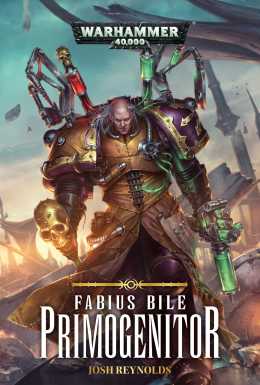 The Clone Lord steps into the spotlight…
The Clone Lord steps into the spotlight…
He is known by many names — Clonelord, Manflayer, Primogenitor. He is the epitome of deceit and perversion, and feared by man and monster alike. Once the Chief Apothecary of the Emperor’s Children, the madman known as Fabius Bile possesses a knowledge of genetic manipulation second to none. Now a renegade among renegades, he is loathed by those he once called brother, and even the most degraded of Chaos Space Marines fear his name. Exiled for his dark experiments, Bile has retreated deep into the Eye of Terror, leaving a trail of twisted abominations in his wake. But when a former student brings word of the ultimate prize for the taking, Bile is unable to resist being drawn once more into the cauldron of war. For in seizing this prize, Fabius Bile might yet discover the one secret his has been unable to unlock… the secret which will prevent his inevitable doom.
I wasn’t sure what to expect from this novel. I’ve been a fan of Reynolds’s for quite some time, but have predominantly read his shorter fiction. In this, the third series from Black Library to tackle a renegade marine hero, Reynolds turns his attention to the Fabius Bile, former lieutenant commander and chief apothecary of the Emperor’s Children. As it turned out, Primogenitor is an excellent science fiction novel.
There are many things to like and welcome from this novel — including Reynolds’s well-composed prose, the great momentum of the narrative, and the superb characterization throughout. Fabius Bile has, before now, sometimes come across as cartoonish — an insane, butchering doctor who will gleefully go to town on his subjects (willing and otherwise). In this novel, however, Reynolds does an excellent job of giving him plenty of layers, and a universe-weary sensibility that made him far more interesting and complex than previous portrayals.
The novel is presented from two main POVs: Bile himself and a former protege, Oleander, who left Bile’s collective and joined one of the many Emperor’s Children warbands that are plaguing the galaxy. The latter has returned seeking Bile’s aid in his new master’s quest for apotheosis. “The Radiant”, as he has pompously come to refer to himself, has decided that it’s time to attain daemonhood, and is intent on following his primarch, Fulgrim’s path (which was shown in McNeill’s Angel Exterminatus). So, Eldar involved… and Harlequins… (that’s enough of that, now — for more, read the novel).
One of the best things about the novel is Reynolds’s restraint, when it comes to all things Chaotic. This is not to say that the novel is devoid of deviance and damnation: far from it, in fact. But, the author is able to rein in on the descriptions and avoids turning his characters into cartoons. Instead, when the Emperor’s Children’s horrific acts are presented, they come across as truly horrific, sometimes skin-crawling. In this respect, Primogenitor follows the mould of Aaron Demski-Bowden’s Night Lords trilogy and Black Legion novels, John French’s Ahriman series, and the Horus Heresy epic — the renegades are not jokes, or lampoons of “Evil Characters”. They are more nuanced, complex and often scarier. Reynolds’s characters retain at least a shade of their former nobility.
Many examples of this can be found in Oleander. He is presented as pretty sane and balanced, for the main, but Reynolds never lets the reader forget (for long) that all of the Emperor’s Children have fallen from grace, despite their lingering nobility and sense of brotherhood and/or purpose. Here’s one example, of Oleander’s own work…
The stage, like the auditorium, had been made from flesh and bone. Unlike the walls and benches, however, it still lived. Bodies had been linked with heat and surgery, forced to grow into one another. Pruned, shaped and reinforced by careful attention. Oleander was quite pleased by the result. It had taken him a long time to get it right. The rear struts had kept dying.
The story, as I’ve mentioned, has great momentum. I never wanted to put it down, so eager was I to follow Oleander, Bile and their companions as they embarked on this new mission. Primogenitor has many classic quest and adventure elements, perfectly skinned in a modern WH40k novel. The action scenes are interesting, varied, and never outstay their welcome. Everything is stitched together perfectly to create a superior WH40k read. I’d be amazed if most fans of the setting didn’t enjoy this. Certainly, fans of the aforementioned series by Dembski-Bowden and French, and the Heresy books should lap this up.
I guess most readers will come for Bile, though. And on this, Reynolds delivers in spades. He’s a very interesting character, and I think the author has absolutely rescued him from caricature. Suffering from a blight that destroys his body (he’s on his umpteenth cloned body), Bile is single-mindedly focused on creating a new humanity, seeing it as his way of saving the human race. He experiments still, certainly, and has made strides in his attempts to re-create the Emperor’s experiments and scientific breakthroughs. He is also still smarting after Abaddon’s destruction of his new batch of cloned primarchs (see Talon of Horus for one impression of these events). Oleander’s discussions with Bile help flesh out the latter’s character. Bile has grown ever-further apart from his legion, appalled by the total collapse of discipline and sense. He is weary, and also feels at least a little guilty about his part in the Legion’s decline.
‘Our Legion is gone, Oleander. It was broken on the reefs of Fulgrim’s desires.’
‘Desires you helped fulfil.’ It wasn’t an accusation, so much as a statement of fact.
‘I saw the world differently then,’ Bile said. His voice was flat, even to his own ears. ‘There was a glory amidst the madness. A sort of divine rebellion, Oleander. You experienced it as much as I did. Where our gene-father led, we followed. Blindly, devotedly, wholeheartedly. We lapped it up, like eager dogs. Gorged on it, until we were fit to burst – and until it consumed us in its turn.’
Overall, then, this is a very good novel. It exhibits the best of both classic and modern Black Library fiction — an attention to characterization that is neither subservient to, nor overshadowed by action. It was entertaining, interesting, and expanded my impression of the Emperor’s Children. I liked this very much.
Definitely recommended for fans of WH40k and the Horus Heresy series.
More, please.
*
Fabius Bile: Primogenitor is available in print and eBook and an amazing limited edition, as well as for Kindle.

Reynolds also wrote the superb first and last Warhammer: End Times novels — The Return of Nagash and The Lord of the End Times. Both of which I have reviewed: The Return of Nagash and The Lord of the End Times
I loved this book! (I actually hadn’t planned on picking up this book until I had read your review 🙂 )
Especially the way Slaanesh-worship gets portrayed shows the same kind of nuance that had made the Night-Lords-trilogy so captivating. And Bile’s disillusioned/idealistic perspective on Chaos and the Legions was always interesting to read. What makes these more nuanced Chaos-Space-Marine-stories so interesting to me is how they perfectly capture the grim downward-spiral the WH40k-universe finds itself in. Bile’s thoughts on entropy are really fitting in that regard.
I also liked the novel’s portrayal of the Eldar. They aren’t exactly the good guys and had their own objective.
LikeLiked by 1 person
Agreed. Glad you liked it!
LikeLike
[…] Also on CR: Reviews of End Times: The Return of Nagash, End Times: The Lord of the End Times, Fabius Bile: Primogenitor […]
LikeLike
[…] on CR: Reviews of Fabius Bile: Primogenitor, End Times: The Return of Nagash and End Times: The Lord of the End […]
LikeLike
[…] Also on CR: Reviews of End Times: The Return of Nagash, End Times: The Lord of the End Times and Fabius Bile: Primogenitor […]
LikeLike
[…] on CR: Reviews of Primogenitor, Return of Nagash, The Lord of the End […]
LikeLike
[…] Also on CR: Interview with Josh Reynolds (2017); Review of Primogenitor […]
LikeLike
[…] Also on CR: Interview with Josh Reynolds (2017); Review of Primogenitor […]
LikeLike
[…] Also on CR: Interview with Josh Reynolds (201); Review of Primogenitor […]
LikeLike
[…] on CR: Interview with Josh Reynolds (2017); Reviews of Fabius Bile Primogenitor and Clonelord, Fulgrim: The Palatine […]
LikeLike